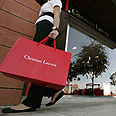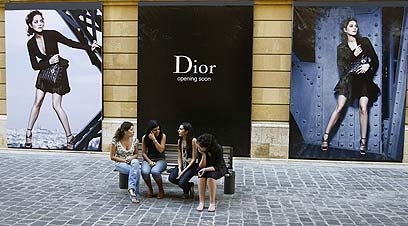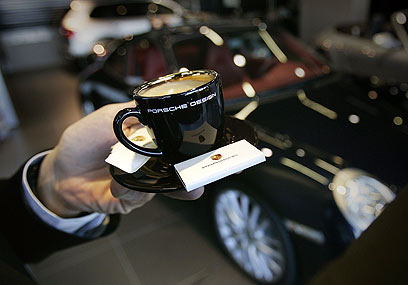
Beirut sets out to woo back shoppers
Lebanese capital regaining its reputation as a shoppers' paradise, with luxury labels such as Christian Dior and Louis Vuitton among a slew of shops opening in city's renovated souks
Dethroned by Dubai as a top destination for shoppers, downtown Beirut today has embarked on a charm offensive as it seeks to attract visitors with ambitious projects like the "Beirut Souks," where 400 stores, 49 of them jewellers, are set to open in coming months.
"Luxury is spreading like an oil stain through downtown Beirut," said Guillaume Boudisseau, a consultant with Ramco Real Estate.
"And downtown is now the place to invest," he added.
The city center, devastated during Lebanon's 1975-1990 civil war and paralyzed between 2007-2008 by an opposition sit-in and by the Israel-Hezbollah war in 2006, today is bustling with activity.
Hotels, restaurants and shops are opening at every turn.

Poster announcing opening of a Christian Dior shop in downtown Beirut (Photo: AFP)
The old souks have also been revamped to the tune of 100 millions dollars and house names like Vivienne Westwood, Armani, Berluti and Cartier.
International designers who hail from Lebanon also showcase their work in their capital: Elie Saab and Zuhair Murad both have ateliers in the high-brow shopping district.
While Beirut still can not compete with the wide array of boutiques Dubai offers, it has one advantage in addition to its long-standing reputation: it's all available within walking distance.
Tony Salameh, CEO of Lebanon's top luxury importer Aishti, hopes the city will "reclaim its position as the shopping destination of choice in two years' time."
Salameh says the luxury market in Lebanon is on the rise too, estimating growth at close to 15 percent annually.
Dubbed "the Paris of the Middle East" before the war, Beirut re-emerged as a showcase for style after the end of the fighting, despite an economic slump and still-shaky infrastructure in the 1990s.
But the country was once again plunged into a period of instability following the 2005 assassination of billionaire ex-premier Rafiq Hariri, who is credited with having rebuilt central Beirut.
"That's when we lost the race to Dubai," Salameh said. "But today, the global crisis that hit the Gulf countries hard has played to the benefit of Lebanon."
Western tourists making a shy comeback
Unlike many of its neighbors in the region, Lebanon, so far, has largely weathered the economic downturn, thanks in part to its solid banking sector.
"We now have the chance to regain first place instead of Dubai, because its clientele, mainly wealthy Russians, accounted for between 60 and 65 percent of its turnover," said Salameh. "And that has disappeared."
He said some of the clients at his high-brow department store don't flinch at spending 200,000 dollars (134,600) per season.

Drinking cappuccino while inspecting Porshe (Photo: AFP)
The shopping area is not limited to the souks with boutiques opening in nearby streets, transforming downtown Beirut into a big outdoors shopping mall wildly popular among visitors from Saudi Arabia, Kuwait, Qatar and other Gulf countries.
Western tourists, largely absent in past years because of security concerns, have also have also begun making a shy comeback.
"Gulf clients prefer to shop here in Beirut, because to them it still represents sophistication," Salameh said.
Fadwa, a visitor from the United Arab Emirates, says the arcaded streets are "the new Dubai, but much prettier."
Wafa al-Ayuti, a wealthy Egyptian tourist, agreed: "It's both modern and intimate at the same time."
"It's like Paris," added her mother as the two walked down a street in the shopping district.
But the Beirut Souks' new and improved face has left some seasoned denizens feeling nostalgic for the old city.
"These are not the popular souks of my youth," said Lebanese Randa Abi Rjeil.
"I feel more like I'm in Europe, rather than Beirut," she added. "All that is left from what I remember are the street names."










